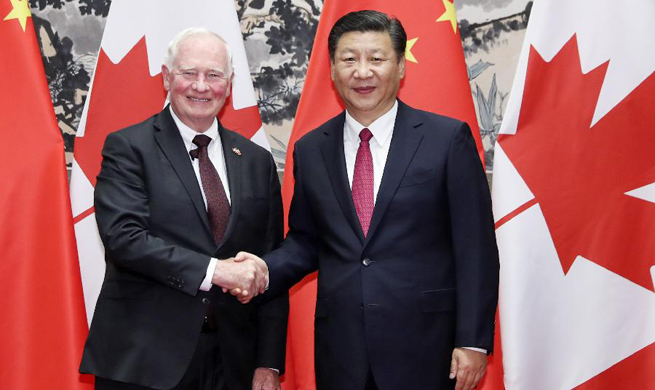CAIRO, July 14 (Xinhua) -- The approval of International Monetary Fund (IMF) executive board showed "support for Egypt and their success in pursuing their ambitions economic reform program," said Christine Lagarde, Managing Director of IMF.
"The Egyptian government and the central bank have taken the right measures to rein in inflation, reduce the budget deficit and set the Egyptian economy on a path to stability and growth," Lagarde added in a statement.
The IMF Executive Board approved on Thursday the release of 1.25 billion which is the final installment of a second tranche of a 12 billion dollars loan to Egypt.
"We believe that these efforts will yield results," Lagarde added.
Cairo is expected to receive the new disbursal very soon, said Chris Jarvis, the IMF's mission chief for Egypt.
Egypt agreed a three-year, 12 billion dollars IMF loan program in November that is tied to ambitious economic reforms such as subsidy cuts and tax hikes.
Egypt received an initial 2.75 billion U.S. dollars tranche from the IMF last November.
Egypt's reform program began with a good start that contributed in increasing the country's cash reserve remarkably, said said David Lipton, the IMF first Deputy Managing Director and Acting Chair.
"The reform helped the transition to a flexible exchange rate smoothly, eradicated the parallel market and increased the reserves of the central bank reserves significantly," Lipton added in a statement.
The energy subsidy reform, wage restraint, and the new added value taxes, have contributed to reducing the fiscal deficit and saved more resources for social spending to support the poor, Lipton added in a statement published on the website of the IMF.
The confidence in local market as well as increase in capital flows are good indications about future growth, the statement added.
He added Egypt's immediate priority is "to reduce inflation, which poses a risk to macroeconomic stability and harms the poor."
The IMF's acting chair hailed the central bank measures for reducing the inflation and preserving the exchange prices flexible, which maintained the competitiveness capabilities.
Since the 2011 revolt that toppled Hosni Mubarak, the Arab world's most populous country has seen a sharp decline in tourism revenue and reduced foreign investment, caused by political instability and security issues.
To obtain the IMF loan, Cairo adopted austerity measures to implement needed reforms by applying value added tax, cutting public energy subsidies and liberating the exchange rate of the Egyptian pound.
The central bank floated the currency in November to limit shortage of foreign currency. The official exchange rate of the U.S. dollar then rose from less than nine pounds to over 17.83 pounds at the moment.
The currency liberation helped to clinch a three-year IMF deal, but the prices hiked sharply. Egypt's core inflation has then soared to its highest level in over a decade, hitting 31.95 percent year on year in June from 30.57 percent in May.
Rising prices present a challenge for President Abdel Fattah al-Sisi and his government, which have pledged to push ahead with sensitive austerity measures like fuel and electricity price increases.
Egypt's central bank raised last week its key interest rates by 200 basis points, citing it would "anchor inflation."
The monthly inflation rate in Egyptian cities eased to 0.8 percent in June from 1.7 percent in May.
The foreign currency reserves reached 31 billion U.S. dollars in March, the highest ever since March 2011, when it was estimated at 36 billion dollars.
Seeking to attract foreign investment and improve the investing climate, Egypt's parliament in May has passed a long-delayed investment law to streamline doing business in Egypt and to create incentives it hopes will bring back investors' dollars after years of turmoil.
Egypt Foreign Direct Investment (FDI) jumped to 39 percent in the first half of the current fiscal year ending in June to reach 4.3 billion dollars.
Egypt has ranked in the second place among Arab countries in FDI flows, with a rate of 27%, according to a 2017 report published by the Kuwait-based Arab Investment and Export Credit Guarantee Corporation published on Friday.

















